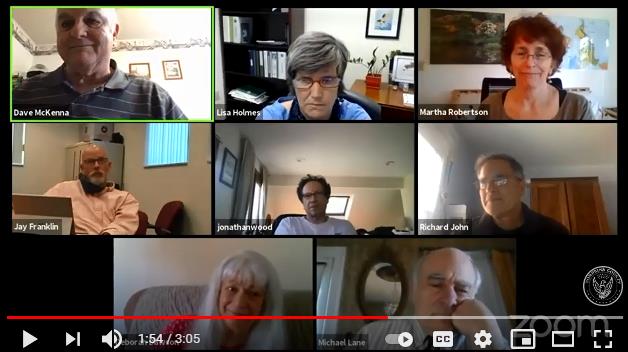County Legislature informally backs “Maintenance of Effort” Budget
by Robert Lynch, April 27, 2021
In what may have been his Last Hurrah at local number crunching, departing County Administrator Jason Molino Tuesday (Apr. 27th) persuaded his Tompkins County Legislature to embrace a “Maintenance of Effort” 2022 County Budget outline, a highly-tentative and fiscally volatile first peek at next year’s County spending, a plan that projects a less than a two per cent tax levy increase and proposes no new big hiring or spending initiatives.
“If these were normal times, I would consider the higher amount,” remarked the Legislature’s Budget Chair, Deborah Dawson. “But these are not normal times.”
That “higher amount” to which Dawson referred was Molino’s second alternative, one which would hike the tax levy by nearly $1.4 Million or 2.66 per cent, probably elevating it above the state’s yet-to-be-determined tax cap.
In a straw poll that climaxed the evening’s more than two hour zoom meeting, the more frugal Maintenance of Effort Budget, with its 1.89 per cent levy increase, won the support of 11 of the Legislature’s 14 members. Only two lawmakers, Dryden’s Martha Robertson and Danby’s Dan Klein, favored the 2.66 per cent choice. Legislature Chair Leslyn McBean-Clairborne would split the difference, raising the levy to match the guesstimated 2.35 per cent tax cap.
Tuesday’s votes were non-binding, and Molino’s projections remain so preliminary that just about anything could change before the Legislature’s formal 2022 budget review commences in the fall.
Indeed, Tuesday night’s so-called “budget retreat,” traditionally convened on the fourth Tuesday in April, always has a hush-hush quality to it. The retreat is never an official meeting; lawmakers minimize its publicity; and they grudgingly open their confab to the public only because New York law says they must. Minutes are seldom taken. Votes are never binding.
But this year’s presentation also held a swan-song quality. Administrator Molino prepared the budget estimates, but he’ll never shepherd his projections to final adoption. The local government’s top appointed officer announced last week he’ll depart his current post at the end of May to return to western New York and take a job in Livingston County. His subordinates will likely guide the figures through formal review.
Especially given this year’s evolving recovery from the pandemic’s lockdown, Molino’s springtime projections are only best guesses of what the County may encounter when 2022 commences a full eight months from now. Molino projected a four-point-five per cent annual boost in sales tax revenue, crediting pent up demand and a possible increase in travel for the growth . Welfare spending, the Administrator said, appears to remain in check, even falling in some programs, a trend he credited, in part, to the State’s eviction moratorium.
Molino pegs his tax cap estimate to inflation and predicted annual price rises next year of between 2.5 and three per cent.
“We have to look at County needs first,” Molino cautioned the Legislature, urging acceptance of the lower levy number. He suggested the County tap both its hefty fund balance and expected federal stimulus money to give contract agencies, like the library and the Human Services Coalition, modest increases.
The County cut its work force by six per cent last year to address the funding constraints imposed by COVID. You’re “stretched thin” in some departments, Molino warned. He suggested the County might need to spend more during recovery to replenish needed staff.
The difference between Molino’s favored “Maintenance” budget and the more generous option legislators Robertson and Klein favored strikes primarily at how departments and agencies might secure any requested increases. The majority foresees agencies begging for add-ons individually in the fall. Lawmakers like Robertson, would rather those requests be addressed up front.
“Maybe it’s a bleeding heart thing,” said the Dryden Democrat. “The non-profits have just carried this community, crawling on hands and knees just keeping people on their backs.”
But most agreed with Budget Chair Dawson that the more modest up-front spending figure—still a $991,000 levy increase from the current year—is preferable.
“I think a 1.89 per cent Maintenance of Effort is saleable,” said Dryden’s other legislator, Mike Lane. “We’re just paying what we need to.”
Newfield-Enfield Republican Dave McKenna termed the lower number “a good starting point,” a percentage that “can only go up, not down.”
Molino estimated that the majority’s recommended budget would raise taxes on a benchmark $200,000 home by $24; the higher-priced alternative, $33.
Tuesday’s straw poll support may be ratified by the Legislature in formal session May 4th. But the figures under review Tuesday could fluctuate wildly from now through fall. In many respects, especially this year, it’s just too early to budget.
###
October 24, 2001
County Administrator Molino to move on after three years
by Robert Lynch, April 21, 2021
True insiders saw it as no surprise. Jason Molino and his family yearned to return to western New York. But it may have caught others off guard.

Molino, chosen in January 2018 from among three finalists to become Tompkins County Administrator, announced his resignation Wednesday morning (Apr. 21st). The announcement followed Molino’s informing the Tompkins County Legislature during a closed-door executive session at the end of its Tuesday night marathon meeting. The Administrator will depart his County post in late-May.
“This has been an extremely difficult decision, but it is the right one for me and my family,” Molino wrote in a letter to his staff, words shared with the public as part of his resignation announcement. “This new position will afford me a better balance in my life and opportunities to be closer to our families.”
The County Administrator will depart his current job to become Executive Director of the Livingston County Water and Sewer Authority, a position some might see as a lateral move. Before coming to Ithaca, Molino served as City Manager of Batavia.
“Jason has served this County with integrity every single day in this role,” said Leslyn McBean-Clairborne, Chair of the Tompkins County Legislature. Molino, she said, “has brought a thoughtful presence as our administrator, showing deep support for our staff and fiduciary tact putting together budgets under ever-more-complicated circumstances.”
Though Molino has had his critics, most County lawmakers have welcomed the Administrator’s more regimented, by-the-book management style. During his brief tenure, Molino has expanded the stature and authority of the appointed manager’s role, some seeing it as nearly reaching the point of an elected County Executive. The Administrator’s leadership has most prominently stood on display during the COVID-19 crisis, when Molino’s command of the County’s Emergency Operations Center consumed his heightened attention and his biweekly, data-driven COVID PowerPoint briefings to the County Legislature became a constant fixture.
In announcing his imminent departure, Molino placed particular pride in his efforts toward establishing the County’s Office of Veteran’s Services, recruiting the County’s first Chief Equity and Diversity Officer, merging the Mental Health and Public Health Departments, and most recently, overseeing the ambitious, albeit controversial, City-County Collaborative to reimagine local policing services.
“Tompkins County has had a track record of excellence under Jason’s leadership, McBean-Clairborne said. “We’re often first in the State and a community that others look to and admire.”
According to his professional Bio, posted on the County’s website, Molino holds a Master of Public Administration degree from the Rockefeller College of Public Affairs & Policy, University of Albany, State University of New York, and a Bachelor of Arts in Political Science from Norwich University, Northfield, Vermont. A veteran, Molino served for seven years, reaching the rank of Petty Officer Second Class, in the United States Coast Guard Reserve.
The County Legislature has yet to name Molino’s interim replacement, though Deputy Administrators Lisa Holmes and Amie Hendrix stand as prime candidates. Wednesday’s announcement stated that, “a comprehensive search for the next County Administrator will begin later in 2021.” The open-ended timetable could spill selection of a new Administrator into 2022, when at least four new legislators will succeed those retiring at year’s end.
According to a posting on LinkedIn, advertising the (now-filled) Livingston County position Molino will fill, the position’s “expected salary range is $115,000 – $130,000, depending on qualifications,” with benefits to be negotiated. The pay stands roughly equivalent to Molino’s current Tompkins County salary, listed in County personnel records at just over $135,000.
###
October 24, 2001
Bridges and Bucks: Do those who pay have final say?
by Robert Lynch, April 21, 2021
Looked at one way, this is just a piddling little story about a trifling country bridge in Dryden; hardly hot news to interest those of us in Tompkins County’s western reaches. But viewed another way, it tells a story of policy and the power of the purse. And it’s why Tompkins County lawmakers consumed a full two hours of their meeting Tuesday night (Apr. 20th), the same evening that County Administrator Jason Molino would later tender his resignation.

It serves us best to pick up the story in midstream. The Dryden Town Board wants to replace an historic 1882 truss bridge in Varna that carries Freese Road over Fall Creek. The Town’s applying for a generous State grant that would fund all but five per cent of the $2.7 Million expected cost. Councilperson Dan Lamb and about a dozen of his townspeople, many of them Freese Road residents, appealed to the County Legislature Tuesday to pick up the Town’s five per cent share.
At first blush, a no brainer, since the County stands responsible for maintaining bridges of that length, anyway, and the grant would be a bargain. But of course, there’s a catch.
Instead of a modern, two-lane bridge fit for 21st Century traffic, Lamb, the Dryden Town Board, plus all of the attending neighbors want the old, one-lane bridge replaced with yet another one-laner. They also want to gussy up the new bridge with sidewalks, decorative trusses, maybe an observation deck, and stoplights at both ends, the latter partly to placate State funders. The County, meanwhile, considered a wider, two-lane bridge back in 2018, but shelved the idea amid the Town’s second thoughts.
“The County does get a say in what we decide to fund or not,” a mildly peeved Dan Klein, legislator from Danby, lectured his colleagues Tuesday. “We don’t just pay anyone that asks for a bridge. We pay for a bridge that we want.”
Enter Enfield-Ulysses legislator Anne Koreman, who proposed to amend an otherwise-routine bridge funding bill by inserting language that would compensate “the full local share” not only for the Freese Road structure, but also set similar policy for structures funded in the future under that Bridge New York Partnership.
Blanket funding was (sorry) a Bridge-Too-Far for many, including for the Ithaca Town’s Shawna Black, who worried about setting a precedent instead of resolving just one little superstructure at a time.
“Personally, I don’t like one-lane bridges,” said Black, noting she has two, one-lane bridges in her district’s Forest Home hamlet, east of Cornell. “But,” she added, “I will say as a legislator, I would support my residents of Forest Home because that’s what they want. I think we have to listen to the neighborhood.”
Legislators drew polite battle lines, including between Dryden’s two County legislators, Martha Robertson (pro-funding) and Mike Lane (opposed). But after that full two hours of citizen input and legislative banter, lawmakers found themselves going nowhere but in circles. Koreman pulled her amendment. The Freese Road funding was set aside, likely to be worked over in committee. The non-controversial underlying Resolution quickly passed.
Time seems on nearly everyone’s side—perhaps. Black spoke of revisiting the Freese Road bridge’s funding in “one to two years.” But Robertson cautioned that without a firm County commitment, Dryden might walk away from the grant altogether, fearing her Town would be stuck with the full local share.
“To withhold funds because the County didn’t get exactly what some in the county wanted would be really unconscionable,” said Freese Road neighbor David Weinstein.
Put another way, from another perspective, this by bargain-spotting legislator Deborah Dawson, “God, people, we’re making a mountain out of a mole hill.”
###
County launches Broadband Study amid questions about secrecy
By Robert Lynch, April 20, 2021
They’ve set an ambitious timetable, to say the least. But exactly how much progress they’ll share with you before their job is done remains an open question.

Organizers of a County sponsored, but partly municipally-funded, probe into expanded broadband Internet access convened for a 90-minute kickoff meeting Tuesday. Planners outlined their goals, their timing, and the assumptions they’ll use. But the online session ended with municipal leaders questioning a County-level decision to keep many of the study’s findings proprietary secrets until the whole effort nears final completion.
The Broadband Study, authorized by the Tompkins County Legislature last fall, and funded in part by $5,000 contributions from Enfield and other municipalities, seeks to identify underserved, predominantly rural, areas in need of better broadband access and then engineer a new, potentially County-owned, cable-based network to serve them.
“The assumption is that the County would own the assets, or the Southern Tier Network would own them,” said Katie Borgella, Tompkins County’s Commissioner of Planning and Sustainability. The Southern Tier Network (STN), a non-profit corporation heavily involved in the study’s planning from the start, would likely string the cable to connect the underserved rural dead-spots, and then lease those lines to Internet Service Providers to bring customers their end-use content.
The intermunicipal Broadband Committee, a creation of the Tompkins County Council of Governments (TCCOG) has drawn one member each from the nearly one dozen local governments and school districts participating.
As outlined by the kickoff’s lead speaker, Blake Stovall, Broadband Engagement Leader for Fujitsu Corporation, another key player in the current effort, the study’s task could be finished in as little as four months. The study’s data collection phase could wrap up in just 15 days; a market assessment completed only a month later; a “high level design” study finished a month after that; an operation and maintenance plan to follow by day 100; with the study’s finale possible just 20 days thereafter.
Stovall did not, however, predict how much longer it might take for cables to be strung or houses served.
Yet overshadowing the STN/Fujitsu study at the moment is a top-level penchant for secrecy: How much can municipal leaders publicly share with their governing boards or with the constituents—prospective broadband customers—that they represent? As Tuesday morning’s meeting wound down, top-level officials made clear they’d prefer sealed lips over candor. In fact, they might wish that even the kickoff’s most basic assumptions be kept under wraps.
With disclosure, said Borgella, “We might be shooting ourselves in the foot.” The planner warned that releasing too many internal findings might compromise success. Looming large to Borgella and other players is the fear that likely competitors—most notably Charter-Spectrum, the county’s largest and often monopolistic broadband provider, might exploit the findings and then use them to game the market and thwart the County’s initiative.
Kickoff speakers, including the Planning Commissioner, pointed participants to a supposed letter of agreement between the County and its study partners, one urging restricted disclosure.
In an April 8th memo to Broadband Committee members and others, Borgella wrote, “The County will ask all the recipients of information regarding any specific plans to build a network with STN infrastructure to refrain from public disclosure of such information.”
In that memo, Borgella further urged members not to disclose the number of new miles of broadband infrastructure proposed, any service maps, or “proposed infrastructure locations.” She described such items as “sensitive or confidential information. ” Such facts, she said, the committee could discuss privately, the County Legislature may discuss in closed session, but remain findings that “are not intended to be shared externally.”
The Planning Commissioner did not say Tuesday whether she, herself, had requested the secrecy, or whether others in County Administration had demanded it.
“If you don’t bring the public along, you’re dooming this project to failure,” responded Enfield TCCOG representative and committee member Robert Lynch (this writer), Enfield’s Councilperson among several openly questioning the County’s top-secret treatment. Lynch said he and others find themselves caught in a bind, told to conceal facts from the governing boards and constituents they owe a duty to inform.
Lynch questioned whether the disclosure restrictions properly square with State law. He was assured the County Attorney had vetted the agreement.
Similarly, Dryden Supervisor Jason Leifer saw little need for the secrecy that County officials have sought. Leifer said Dryden is openly planning its own network to compete with Charter-Spectrum. Town meetings, he said, are open, and information is freely shared.
Whether or not County Brass would prefer it become known, Tuesday’s kickoff settled several points. At Stovall’s suggestion, a point on which no one disputed, the study will set 100 Megabits per second as its minimum threshold for effective Internet service. It’s a level several times the Federal Communications Commission’s current benchmark, but one the agency will likely soon increase. To a lesser extent, the study will also examine competition and competitor pricing in rural areas.
“Our goal is to reach every unserved and underserved person,” stated the optimistic Stovall.
Committee leaders agreed that satellite-based Internet service stood as an ineffective substitute for ground-based systems. And to answer Lansing TCCOG member Joe Wetmore’s question, Stovall added that the project’s goal is “to reach the house, not just the area,” implying cables would be run even to people living hundreds of feet from the nearest road.
Yet the company rep acknowledged the limits of time and money. “Rolling out the plan may have a phased approach,” Stovall acknowledged.
The Broadband Committee plans to meet monthly as the study proceeds.
###
Delay ‘til May: Town Board slow-walks Terms Laws
by Robert Lynch, April 15, 2021
Yes, they kicked the can down the road. But sometimes that kick is what the public wants, maybe needs.

With one member excused, another on-the-fence, and a third dead-set in opposition, the Enfield Town Board Wednesday (Apr. 14th) delayed until May any decision on moving ahead with Supervisor Stephanie Redmond’s quickly-advanced Local Laws that would double the length of future terms for her own office, and also for the Town Clerk and Highway Superintendent.
Instead of scheduling a formal Public Hearing on each proposed law right away, the Town Board will opt for a more casual “Town Hall Discussion” on the trio of measures May 12th, inviting public comment, pro and con, before advancing the laws further.
“A Public Hearing puts more pressure on the public and makes them feel, ‘Oh, the Board’s trying to force this down our throat,’” Councilperson Jude Lemke said in support of the go-slow approach.
On April third, with no forewarning to some Board members, Redmond placed onto Wednesday’s monthly agenda adoption of local laws to extend office terms for Supervisor, Clerk and Highway Superintendent from their current two year length to four years, each change subject to mandatory referendum. Reminded by Councilperson Robert Lynch (this writer) that public hearings must precede Board action, Redmond quickly pulled the proposals, but still scheduled their discussion for Wednesday night’s meeting.
Soon after Wednesday’s discussion began, Redmond moved to set a May Public Hearing. Councilperson James Ricks seconded her motion. But after nearly a half-hour of back-and-forth talk, all members agreed to table the motion and travel the informal route toward May instead.
“It’s a bad idea, and the timing is atrocious,” Lynch said of the proposed laws Wednesday. He noted that party petitioning has already ended. Candidates are locked-in. Most contests remain uncontested, though independent candidates could still petition for November ballot slots.
“I think you’d best let things lie,” Lynch cautioned, gauging constituent sentiment, and adding, “The people in this community, I believe, want a pause in the change that always seems to be occurring. And it’s initiated by the Town Board, not by the people.”
Lynch concluded, “And I will oppose tonight putting this on a Public Hearing, and I definitely will oppose putting it on the November ballot.”
“It’s a tough call,” opined Lemke, whose hesitancy Wednesday could have doomed any scheduling vote, had it actually been held. With only Redmond and Councilperson James Ricks truly eager to proceed, and with Virginia Bryant excused, three affirmative votes might have eluded the Board.
At the discussion’s outset, Redmond waived off any personal political interest underlying her initiative, even though she, currently unopposed in this election cycle, might stand among the most to gain.
“I do not have any personal agenda here, no sinister ulterior motives” the Supervisor insisted.
Redmond also claimed she holds no preference for any voter verdict on the local laws, should they, indeed, come to a vote. Redmond maintained she only wants to offer voters a choice. Nonetheless, the Supervisor placed disproportionate weight on a 4-year term’s advantages for Supervisor, citing leadership continuity, easier budgeting, and the benefits derived from less-frequent campaigning.
“It takes a lot of time and energy to campaign and go through the voting process,” said Redmond, “and it seems like a waste of time to do it every two years when…”—then pivoting to her job—“It’s a big lift; there’s a lot of other work to do.”
Councilperson James Ricks went a step further than the Supervisor, voicing solid support for four-year terms. A longer span between elections would make the process, he said, “a lot smoother.” A two-year turnover, Ricks observed, is “kind of chaotic to me.”
Republican Highway Superintendent Barry (Buddy) Rollins, like Redmond, currently unopposed, also urged longer terms. “I have asked for this for the Highway Superintendent post for the last several years,” Rollins reminded the Board.
Left at the debate’s midpoint, Lemke sought ways to bring the public in tow, suggesting at one point the Board author an informative “White Paper.”
“Rather than just throw it out there with no context,” said Lemke, “if we’re going to put it before the town, it feels we ought to blow out the pros and the cons in more detail and put some sort of White Paper together… to put some framework around the discussion”
But Redmond brushed off Lemke’s idea: “I don’t really feel comfortable influencing resident opinion,” the Supervisor said. “I don’t want to be seen as weighing in one way or another, and I don’t think that’s really our job.”
In advancing her latest initiatives, Redmond sought to anchor them in Enfield’s 2020 Comprehensive Plan. Under its “Municipal Services” chapter and in a purported attempt to decrease “risk to management of Town Resources,” the Plan proposes the Town “Explore a proposal for an increase in length of term” for the three offices. Lynch has countered that a “political statement” of that sort deserves no place in what’s supposed to be a land-use document.
The Supervisor’s latest proposal marks the third straight year Enfield officials have eyed possible changes in elective offices. In 2019, former Supervisor Beth McGee briefly advanced, but then shelved, an extended term initiative much similar to Redmond’s. Then last year, the Board put on the ballot proposed laws to make the positions of Town Clerk and Highway Superintendent appointive, rather than elective. Amid the rallying cry of “Keep Enfield Elected,” both measures lost by margins of better than four-to-one.
“Enfield voters love their Democracy,” Lynch told his colleagues as Wednesday’s debate wound down. “And when they see something going not right, they want to change it,” the Councilperson adding, “and they don’t want to wait four years to change it.”
Similarly, observed Lemke, that with New York lacking a recall law for politicians, when someone you don’t like holds a longer term, “you’re sort of stuck with that person for four years.”
###
Cemeteries to get on-time Spring Haircut
by Robert Lynch, April 15, 2021
For the first time in three years, Enfield’s four Town-owned cemeteries will not likely be overgrown as Memorial Day approaches.

Two years ago, the Town’s switch from in-house to contract mowing delayed the first cutting of cemetery grass until just before Memorial Day. History repeated itself last year when the Town Board forced itself to meet the Saturday morning before that Monday holiday to renew the same contractor’s agreement. Nonetheless, to placate Memorial Day visitors, community volunteers performed most of the initial mowing.
This year, however, pre-planning won out. Wednesday night (Apr. 14th), well in advance of any crisis, the Town Board unanimously (with Councilperson Virginia Bryant excused) renewed contractor Matt Lincoln’s one year agreement to manicure the Town’s four graveyards. Lincoln also serves as Enfield’s Burial Coordinator, his contract for that service similarly renewed by the Town Board Wednesday. As was the case last year, Lincoln will charge the Town $900 for each monthly mowing of all four cemeteries. Lincoln’s contract requires the first mow take place before Memorial Day.
The 2019 absence of maintenance drew the loudest complaints. Residents, appalled by the absence of maintenance and sensing the neglect as an eyesore, vented their frustrations upon the Town Board and Supervisor. Only the stepping-up of volunteers last year prevented a similar uproar.
Coincidental with the inking of the maintenance agreement, the Town Board Wednesday appointed Cassandra Hinkle, currently a candidate for Town Councilperson, as the new Chair of the Town’s Cemetery Committee. Hinkle fills a position left open since Sue Thompson’s resignation last August.
“Cassandra Hinkle has demonstrated her support for this community and has already volunteered her time and efforts in numerous ways toward this Town’s betterment,” stated Councilperson Robert Lynch (this writer) in proudly moving Hinkle’s appointment as Chair.
As her first challenge, Hinkle will get her hands dirty, along with other volunteers, in joining in the annual springtime cleanup of brush that’s fallen on cemetery grounds over the winter. “We’ll rally a crowd of people,” Supervisor Stephanie Redmond told Hinkle and Board meeting attendees Wednesday. One or more April clean-up dates has yet to be set.
In other Town Board business Wednesday:
- Without controversy or dissent, the Board awarded Enfield Highway Department employees three per cent pay raises for the remainder of this year. Former Supervisor Beth McGee had denied those workers raises in her 2021 Town Budget adopted last September, and the Board refused to entertain Councilperson Lynch’s request then to award them a raise of two per cent. Given that the newly-approved three per cent raises are not retroactive, their overall impact becomes about the same as Lynch had proposed.
- A shaky truce of sorts appears to have been struck between the Town and Norbut Solar over lingering issues unresolved when the Town’s Planning Board granted the Rochester developer conditional site plan approval for its new Applegate Road solar farm April 7th. The company and some Town Board members had stood at odds over procedures for resolving neighborhood complaints over potential nuisance impacts, such as glare or noise. Following a lengthy discussion Wednesday between a Norbut representative, a company attorney, and the Board, the parties found common ground in tentatively accepting Councilperson Lynch’s suggestion that Norbut allow the Town’s Code Enforcement Officer expanded powers to investigate any future complaints.
###
Despite changes, Enfield Planners approve Norbut solar project
by Robert Lynch, April 8, 2021

The square-shaped, back-from-the-road solar farm that Enfield residents reviewed not just once, but twice, at public hearings earlier this year—one as recently as last month—was not the project the Enfield Planning Board actually approved Wednesday night (April 7th). Plans have changed. But Town planners concluded, essentially, it’s close enough.
By unanimous vote (with Board Chair Dan Walker abstaining, citing a conflict-of-interest), the Planning Board granted conditional, yet final site plan approval for Norbut Solar’s proposed 15 Megawatt Applegate Road development. It also gave subdivision approval at the site. The Rochester company has scaled back power output and reconfigured its design so that rather than being in a compact square, solar panels will be scattered about in three clumps. And also, they’ll now tilt.
“I don’t like it,” said Enfield Councilperson Robert Lynch. Still supportive of Norbut’s endeavor, but less pleased with the scattered layout, Lynch questioned whether the last-minute revisions, sprung on the Town by Norbut only recently, required yet a third public hearing. Planning Board members brushed off Lynch’s concerns, noting no one from the public spoke out against the solar farm at the prior hearings and that the proposed changes were too minimal to trigger public concern.
Norbut first unveiled its Applegate Road plans last October. In March, it cut the system’s initially-proposed 20 Megawatt output by a quarter, citing limitations in NYSEG line capacity. But rather than just lop off one corner of its Rubik’s Cube design, Norbut scattered apart the three separate 5 Megawatt clusters, in part, to comply with the Enfield Solar Law’s requirement that each array occupy no more than 60 per cent of its tax parcel’s land area.
To meet that rule, the revised design subdivides the 249-acre tract of fields, forests, and brush with jagged boundaries of convenience. Several parcels access Applegate Road, another Route 79. And in an overly-cautious attempt to comply with federal wetlands rules, solar arrays in some cases jump over wet spots to adjacent dry land, wasting otherwise-usable property between the clusters.
Initially in the meeting, Jim Taravella, Norbut’s civil engineer and the only company representative to attend, said Army engineers who review wetlands compliance “typically allow” solar panels to stand within such moist spots. But pressed further by Lynch, Taravella hedged.
With Army Jags, he conceded, it’s “hit or miss.” He said, “Some are fine with it; others not so much.”
Furthermore, Taravella acknowledged, there are “capacity issues” to address. It’s hard to get a Corps of Engineers inspector to visit the site. They’re already late, he advised. And until they visit, they can’t sign off on any waiver.
But Norbut has made other last-minute changes. Most notably, the solar panels will no longer stay fixed in place. Instead, they’ll be “tracking panels,” motor-driven and tilting, timed to follow the sun. Taravella said the change will improve the array’s efficiency and mitigate the limitations the utility imposed.
Asked by Lynch whether the motors would heighten noise or if the tilting would make the project more “industrial,” both Taravella and Board members minimized the impact. Lynch was told the motors make no more noise than does an air conditioning compressor, that the sound would not be heard at the road, and the tilting is so imperceptible that observers wouldn’t notice.
“You’re sticking your nose into what somebody chooses to do with his land,” Planning Board member Ann Chaffee blurted out at Lynch, after the Councilperson questioned whether the less-efficient revised layout might lay to waste acreage that could better be left to crops.
“That’s why we have a Solar Law,” Lynch retorted, defending the 60-per cent rule’s intent to preserve farmland and open space.
Taravella maintained the more scattered layout actually consumes no more land for the revised 15 Megawatt system than the original proposal would have for the larger system. And he said the array’s western boundary fence is similarly set back, exactly 351 feet, from Applegate Road.
“Solar arrays,” Lynch counseled planners, “are valuable, necessary, and advance the Green Economy.” But, he cautioned, they’re “also ugly.” Lynch cited the massive array off Newfield’s Millard Hill Road as his example.
“I actually like it,” Enfield Supervisor Stephanie Redmond said of the new, moisture-sensitive layout. “I like it in they can protect the wetlands.”
But in a couple of ways, Norbut executives have chosen to stand their ground against the Town, arguing against the kinds of safeguards they’d need to put in place in case something goes terribly wrong.
In March, Town representatives requested Norbut establish a Dispute Resolution Plan to address potential resident complaints.
But in a terse April 2nd letter presented Town planners, Norbut’s Jonathan Stone shot down the request.
“In response, we have researched the concept of applying such a plan to Solar projects, reviewed all of our previous projects, engaged our professional consultant partners and were unable to find another example of this type of plan being applied to a solar project,” Stone wrote. “We respectfully request that the Board consider our response to this matter as adequate and consider the value of our business model in support of our ongoing commitment to the property and connection to the Town and its residents.”
On a second point, Norbut proposed a surety bond to guarantee the Town moneys it would need to pull down the array should Norbut go broke. Redmond, purportedly at the advice of counsel, requested a more certain “irrevocable letter of credit” or even a cash security. No-Go, Stone wrote:
“A decommissioning bond is the financial surety utilized by Norbut Solar Farm, LLC in connection with its projects, and is a generally accepted form of financial security in the solar energy system field.”
Other than engineer Taravella, no one else from Norbut attended Wednesday’s meeting, either to answer questions or to welcome the Board’s approval. Planning Board endorsement came conditional upon both the Town Board’s acceptance of a financial surety of some type, and the resolution of pending requests for a so-called “PILOT Agreement” to ensure the Town tax revenue. Norbut will also need to negotiate a “Community Host Agreement” to sweeten the Town’s financial reward.
But after the vote, Lynch noted something’s changed. In the final stages of review, with a new engineer at the helm, and with changes imposed with little warning, Norbut’s plans and whimsical alterations make it, he said, a moving target.
“What our residents, the farm’s neighbors, reviewed at not one, but two public hearings is not what the Planning Board approved tonight,” Lynch wrote in a critical Wednesday night memo to Town Board colleagues. “That’s not only legally risky,” he wrote. “It’s also publicly irresponsible.”
###
The three-minute meeting for the building they want
by Robert Lynch, April 8, 2021

The Agenda called for “Updates.” But the public heard none of them.
The Downtown Facilities Committee of the Tompkins County Legislature met Thursday afternoon (Apr. 8th). Only a rookie reporter would lead a story that way. But frankly, aside from a moment of spontaneous political snark, that’s about all anyone from the public ever got to see or hear.
After three minutes and five seconds, the committee adjourned into executive session to learn those purported “updates,” whatever they were. We on the outside don’t get told.
Apart from routine minutes’ approval, the only matter of substance came from committee member Rich John. And he addressed the precise issue of pervasive secrecy that’s kept Downtown Facilities planners huddled behind locked doors, electronic or otherwise, month after month for nearly two years. All the while next to nothing gets done to move forward an ambitious building and renovation plan, its current price tag pegged at over $20 Million.
“I wanted to let the committee members know that I have received some public comment… just questioning the amount of time we’re spending in executive session,” reported John. “I provided assurance,” he added, “that we’re trying to determine details of the overall project, and we’re clearly not making development decisions in executive session. But I wanted everybody to know that I have received inquiries.”
“I’m not surprised, Richard,” said Downtown Facilities Chair, Newfield-Enfield’s Dave McKenna. “I’m not surprised at all.”
“Robert Lynch would have something to say about that,” Lansing’s Deborah Dawson remarked with a grin.
Dawson may have grounded her swipe upon Lynch’s campaign announcement of the day before, in which this writer, an Enfield Councilperson and candidate for McKenna’s legislative seat, urged for more transparency in County Government, and argued that a “business case” be made for any new County offices before shovels turn.
After Dawson’s remark, accompanied by another legislative smile or two, but a noticeable frown from Dryden’s Mike Lane, off into executive session the committee went. The YouTube meeting screen fell dark.
New York’s Open Meetings Law, specifically Article 7, Section 105 of the Public Officers Law, clamps tight controls upon governmental executive sessions. Doors can be closed for lawmakers to discuss personnel, criminal investigations; or perhaps more pertinent here, “discussions regarding proposed, pending or current litigation” and “the proposed acquisition, sale or lease of real property.”
No Open Meetings Law exception is made, however, for mere project “updates,” or as John put it, “trying to determine details of the overall project.”
“The ornate windows of our 1854 legislative chambers may be old and narrow. But they can still can let in much sunlight,” Lynch observed when he urged open governance during his campaign rollout. That Thursday afternoon, Ithaca was sunny. But inside the zoom room attended by those on the Downtown Facilities Committee, the darkest of clouds prevailed. They have now for months.
###
The Invisible “Distressed Hospital Fund” that robs our county’s cash
by Robert Lynch, April 6, 2021
[Update; April 9th: Since our Tuesday (4/6) posting, Anna Kelles has learned more. The Ithaca Assemblymember now understands the following: “A hospital fund was set up. I did discover that but it was never used and at the end of the year (that account) transferred to the general fund. Minor detail.” Thanks, Anna. (Remember, that most sales tax money didn’t start rolling in until January of this year.) /RL]
Can you imagine how many Albany auditors would be crawling over Enfield’s books if our Town Board tried this stunt?
But since it’s New York State that plays the shell game, they get a free pass—as always.
County Finance Director Rick Snyder brought bad news to his Tompkins County Legislature Tuesday night (Apr. 6th). January sales tax receipts were down, way down.

For the year’s first month, the County’s share of sales taxes fell $503,000, or more than 16 per cent from the pre-COVID first month of last year.
But there was a reason. And that “reason” makes this story more than just a green eyeshade jumble of numbers.
“It looks pretty severe when you’re down a Half a Million Dollars,” Snyder told the Legislature. “But $331,000 of that was the Highway Robbery.”
Yes, Rick, an apt term, “Highway Robbery,” because the $331,000—about two-thirds of the monthly shortfall—was syphoned off by New York State to fund a newly-mandated and much-touted “Distressed Hospital Fund,” a supposedly dedicated account to help troubled medical facilities across the state blot out the red ink incurred because of the pandemic.
Sounds compassionate, doesn’t it? Hospitals stood at the front lines in caring for so many of us during these times of trouble. Why not bail them out?
Problem is, truth be told, the “Distressed Hospital Fund” doesn’t exist. It’s an accounting fiction.
Credit our newly-minted Ithaca Assemblymember, Anna Kelles, for posing the question nobody else at the State Capitol apparently dared ask.
As County Legislator Martha Robertson relayed the tale to her colleagues Tuesday:
“Someone, I think a hospital, asked [Kelles], ‘so where is the hospital fund? Like where’s that money? And is that going anywhere? And she thought to ask the Comptroller’s Office, and the Comptroller’s office said, ‘Oh, Yeah….’ Then the Comptroller’s Office, come to find out, (said) it was in the General Fund. There was no dedicated hospital fund set up.”
I know, it’s Albany again. Funny-money accounting that would put you or I in jail, but makes Governor Cuomo and his minions look so virtuous!
Mind you, Comptroller Thomas DiNapoli’s website tells a different narrative—no doubt, the legal one.
According to the Comptroller’s website, last year’s legislatively-authorized amendment to the State’s Tax Law directed the Comptroller to withhold, in aggregate, $50 Million from the sales tax collections reaped from counties outside New York City and another $200 Million from the Big Apple, itself. The Comptroller was then supposedly directed to take those dollars and “place them into a New York Agency Trust Fund, Distressed Provider Assistance Account, annually, for two years.” That’s the more commonly-known “Distressed Hospital Fund.”
The Comptroller’s explanation continues, “These funds will be used to provide critical support to financially distressed hospitals and nursing homes throughout the State.”
Only, of course, they weren’t. They were tossed into the General Fund, the account from which just about everything else gets paid, from the Governor’s paycheck on down.
Tompkins County’s January balloon payment occurred because the withholding for all of last year was postponed until January 15th. A similar State skimming of sales tax collections will take place later this year, another $50 Million taken off the top from upstate counties. This year’s assessment will be broken into quarters; the first hit will come April 15th.
Tompkins County’s February’s sales tax collections—when no Distressed Hospital assessment applied—looked somewhat brighter; collections down only 6.8 per cent from the year before.
But lesson learned from one night at the County Legislature: There’s one set of rules for you and me; and yet another for those guys who’ll come knocking at your checkbook little more than a week from now.
Meantime, can somebody find me a distressed hospital or two? I think they’re due some money.
###
Enfield’s Bad Penny
Redmond proposes doubling terms for self, Clerk, Highway Super
by Robert Lynch, April 5, 2021
Maybe some of us thought we’d killed this bad idea last year. Well, really, we didn’t. Or then, maybe we did. Who knows?

In what may amount to more as a display of tone-deaf moxie than sound political judgment, Town Supervisor Stephanie Redmond late Saturday (Apr. 3rd) proposed a trio of new Enfield Local Laws that would double from two years to four the length of terms for her own position and for that of Town Clerk and Highway Superintendent.
But after Town Councilperson Robert Lynch (this writer) objected Monday morning to the measures’ on grounds of both procedure and substance, Redmond, with limited explanation, pulled the laws early that afternoon from the Town Board’s April 14th Agenda. The Supervisor, however, indicated her continued intention to proceed once procedural requirements are met.
Each Local Law, when advanced, would require a Public Hearing, adoption by the Town Board, and then a mandatory public referendum next November. The longer, four-year terms would kick in with the next election cycle beginning in January 2022.
Conveniently for Redmond, her proposals came only after the completion of political party petitioning for those future terms of office, and Redmond finding herself as the only candidate of either major party to file for Supervisor.
“Be advised, I will fight these just as vigorously as I did the changes of last year,” Lynch replied to fellow Town officials in a pointed email upon his first learning of Redmond’s proposals Monday morning (Apr. 5th). Lynch said his response stands based on what Enfield voters have told him.
“Especially given the events of the past year, voters want as much opportunity as possible to alter the course of Enfield Governance,” said Lynch. “Don’t be fooled by uncontested primaries. The show ain’t over yet.”
Lynch’s latter remark alludes to the fact that Independents—including Republicans and Democrats aggrieved by the lack of voter choices—could still petition for non-partisan lines on Enfield’s November ballot. Independent petitioning begins April 13th and runs through May.
Lynch first learned of what he’s termed “Redmond’s Local Laws” Monday morning, though the Supervisor had posted them on Town email at about ten-thirty the prior Saturday night. The Supervisor’s surprise submissions came the same day as the Town Board ratified new Town Clerk Mary Cornell’s decision to appoint her sister, Laura Norman, as her Deputy Clerk, replacing Patricia Speno, whom she’d fired without public explanation.
Cornell, like Redmond, and also Highway Superintendent Barry (Buddy) Rollins, would stand to benefit from Redmond’s proposals. Party filings to date leave each incumbent unopposed in the November General Election.
Although Enfield voters last year defeated, by four-to-one margins, a pair of Local Laws which would have made the offices of Town Clerk and Highway Superintendent appointive, rather than elective, the option of lengthening elected terms was never placed onto the ballot. Then-Supervisor Beth McGee had initially proposed making the Supervisor’s post four years long, but dropped the idea before it ever got to a hearing. Similarly, Lynch briefly suggested four-year terms for Town Clerk and the Highway post, though only, as he’d said, to “complete the circle” once the term extension for Supervisor had been put on the table. When McGee pulled her proposal to lengthen terms, Lynch did as well.
“What constituents have told me since,” Lynch said, “is that four-year terms are a bad idea.” He added, “State law requires Town Councilpersons serve for four years. But with these other offices, Albany gives us a choice.”
It’s actually the third consecutive year that Enfield’s Supervisors have advanced proposals to lengthen elected terms. In 2019, Supervisor McGee floated what amounted to a trial balloon to lengthen future office terms to four years. At the time, in a sharply-worded critique that visibly rankled McGee and another Board member, candidate Lynch equated McGee’s plan to President Trump’s twisting the law to grant himself a hypothetical third term. At a subsequent meeting, McGee summarily dropped her idea, saying she’d found no time to pursue it.
Then, as now, the Supervisor’s plan for extended terms came only after late-winter party petitioning for Town office had ended. Lynch has maintained prospective candidates should know in advance the likely length of terms they’d be serving. The longer the term, the more likely the candidate might enter the race, he’s argued.
Each of Supervisor Redmond’s proposed Local Laws, before being pulled, had ignored the customary legal requirement that a Public Hearing must first be held. Responding to the Board Monday, Lynch identified the hearing’s omission as “a BIG technical defect.” He’d urged the Town to consult legal counsel. In a reply, Redmond acknowledged the oversight. “We will have to set a public hearing,” she said.
Each of Redmond’s Resolutions had attempted to find its support in the Town’s 2020 adopted Comprehensive Plan. Each Resolution stated that, “the Town of Enfield Comprehensive Plan states that the town will explore a proposal for an increase in length of term for Town Supervisor [and each of the other offices].”
“True,” Lynch remarked, “Section 2 of the Comp. Plan suggests longer terms so as to ‘Decrease risk to management of Town resources.’ I’ve also thought such a political statement has no business in what amounts to a land use planning document. But I supported the Plan’s adoption knowing that this one suggestion played such a minor role in the overall composition that one sentence was not a hill worth dying on.”
“What’s more important now,” said the Councilperson, “is the political mood of 2021.”
“People want an end to the food fights, and voters hold the perception that the Enfield Board’s majority has chosen to rule against the public will.” Lynch continued, “The prevailing view is ‘throw the bums out; clean house.’ But when terms become longer, housecleaning is ever more difficult.”
“The more frequently candidates must approach the voters for their support,” said Lynch, “the more responsive public servants become.”
As an example, Lynch said he’d just personally solicited 136 signatures in Enfield and Newfield on petitions designating him as a candidate for the Tompkins County Legislature. “I checked Stephanie Redmond’s petitions for Supervisor,” Lynch said. “She never circulated one petition. She never solicited one signature, aside from her own. What’s wrong with this picture?”
###
All in the Family
Town Board affirms Clerk Cornell hiring sister as Deputy; ex-Clerk Linton to assist
by Robert Lynch, April 3, 2021
In a move holding potential to re-stir the pot of Enfield politics, recently-appointed Town Clerk Mary Cornell Saturday (Apr. 3rd) appointed her sister, Laura Norman, as her new deputy. The Town Board, though not required by law to affirm Cornell’s choice, did so anyway, with one member dissenting and Councilperson James Ricks not attending.

Following Norman’s appointment, the Board, by an identical 3-1 vote, also affirmed Cornell’s request to retain former Town Clerk Alice Linton as an additional, second deputy, the Board’s Resolution stating Linton’s appointment “is necessary for the Town of Enfield to provide adequate support for the Town Clerk in service to the Town of Enfield.” Board members and Cornell argued the additional clerk will help Cornell with her transition to office and at tax time.
“It sure doesn’t look good,” Councilperson Robert Lynch (this writer) stated prior to casting his lone no vote against Norman’s appointment. Lynch said Cornell’s appointment of Norman amounts to nepotism and that were this Tompkins County government, the hiring of a sibling as a subordinate would be prohibited.
The Town of Enfield has no similar prohibition on the direct supervision of relatives. And while New York law limits some government employment relationships, most particularly between spouses, the ban does not extend to brothers or sisters.
Mary Cornell’s hiring decision—technically, her sole legal prerogative and not subject to Town Board oversight—follows by less than two weeks her termination of former Deputy Clerk Patricia Speno, who former Clerk Ellen Woods had brought on as her assistant last year. Cornell has never given a public reason for discharging Speno. Speno dropped off her keys, via courier, March 23rd.
The Town Board first attempted to appoint Mary Cornell to succeed the suddenly-resigned former Clerk, Ellen Woods, at its regular monthly meeting March 10th. To correct a legal oversight, the Board reaffirmed Cornell’s appointment four days later.
But relations between Cornell and deputy Speno quickly deteriorated. On Saturday, March 20th, according to an email from Speno to the Board, Speno reported to work, but was told by Cornell to go home. Also that same day, Speno emailed Supervisor Stephanie Redmond, her memo copied to the Board, stating that problems had arisen between her and the new Town Clerk. “I am hoping we can work this out,” Speno stated. “Some mediation is in order.”
That mediation never came. By the following Monday, Redmond gave to Speno the first indication she should consider herself fired.
“The Town Clerk… is not an employee of the Town Board. Therefore the Town Board has no control over the office of the Town Clerk. The employment of the Deputy Town Clerk as (sic) at the will of the Town Clerk. It has been made clear that the Town Clerk has decided to terminate your employment,” Redmond wrote in an evening email.
Redmond’s and the Board majority’s deference to Cornell remained on display Saturday, with the Supervisor and Councilpersons Jude Lemke and Virginia Bryant declining to overrule Cornell on either her termination of Speno or on Cornell’s preference for hiring her sister.
Though she admitted Cornell’s hiring choice left her a little concerned, Lemke conceded, “We don’t have any control.”
Lynch made clear that he regarded Laura Norman as not only a constituent, but also a friend. Lynch said that if it were former Clerk Woods hiring Norman, he’d fully support the choice, but cast his dissent objecting only to the familial relationship.
An Administrative Manual outlining “The Policies and Procedures of Tompkins County Government,” states that in the County sphere, “No employee may supervise or be supervised by a relative, directly or indirectly.” The policy includes siblings as relatives. A similar anti-nepotism policy applies in the Village of Trumansburg.
In defending its Saturday action, the Board’s majority, including Supervisor Redmond, emphasized that Enfield is a small town and has a history of family members working together, including as supervisors and subordinates.
Members of a well-known political family, Mary Cornell and Laura Norman, the latter most recently with the Tompkins County Board of Elections, are both daughters of former Enfield Supervisor Jean Owens.
As much as half of the Enfield Board’s 40-minute noontime meeting Saturday was devoted to a closed executive session, requested by Lynch, ostensibly “for the purpose of discussing a matter of personnel concerning a particular person.” The closed zoom conclave preceded the vote on Deputy Clerk. Its contents were not disclosed.
Meanwhile, the return of former Town Clerk Alice Linton to Enfield government, the retiree to fill a newly-permanent second Deputy Clerk’s position, brought slightly less controversy, yet still opposition.
“My opposition has nothing to do with the people filling the position,” said Applegate Road’s Diane Aramini, a lay member of the Town’s Finance Committee, during opening floor privileges. “It has to do with expenditures.”
Linton’s second Deputy Clerk’s post will cost $4,000 annually. Lynch, in opposing the appointment, said the new position should be considered in the Town’s normal fall budget cycle, not “ad-hoc.” Aramini suggested the town should find the money for Linton’s salary by cutting Clerk Cornell’s pay accordingly, a move likely forbidden by State law.
Redmond and her majority colleagues defended the new second deputy’s job by touting Linton’s personal expertise and the benefits her skills would provide. Lynch countered that you create a job first because it’s needed; then you find the best person to fill it. You don’t create the job around the person, he argued.
Lynch also questioned that if Linton’s talents are so valuable, why Cornell didn’t hire her for the position Speno vacated. It would have paid more than twice of what Linton will now earn.
“Alice is retired,” Redmond explained. “She wants to spend time with her grandchildren.”
Alice Linton served as Enfield Town Clerk from 2010 through 2019.
###
Oh, Bull!
Genex reaffirms planned closing; jobs lost; tax base hit
by Robert Lynch, April 1, 2021

We knew for months it was coming. We just didn’t appreciate the reminder.
In an announcement New York State law required it to make, Genex Cooperative, based in Wisconsin, re-confirmed Wednesday (Mar. 31st) that its Enfield-based facilities will close as of the end of June. The closing, the cooperative says, will cost the area an estimated 30 jobs and shutter some 43,000 square feet of breeding barns and warehouses in Enfield, near the southwest corner of Sheffield and Hayts Roads.
Word of Genex’s planned closure leaked out in early-January. The latest announcement, issued by a spokesman for the co-op, came in an effort to comply with so-called State-mandated “WARN notice legislation.” Signed by Governor Cuomo last November, the WARN Law, said Genex, “requires companies to notify city and town officials and agencies of a plant closing.” Genex notified Enfield Town Board members and other affected agencies Wednesday via email.
“This notice is to advise you that as of June 30, 2021, Genex Cooperative will be closing its facility at 522 Sheffield Road, Ithaca, NY,” said the co-op’s terse, one-paragraph statement, attributed to Ron Schmalz, Genex’s Vice President for Human Resources.
The only reason stated for the mid-year closing was that the co-op was “moving the livestock (bulls) to other facilities owned by Genex.”
Schmalz did not state whether bovine relocations have already begun or whether any employees on staff, first notified of the cooperative’s plans January 5th, had already been let go.
The Genex statement put the number of affected employees at 30. Of that number, the largest number, 13, were listed as “livestock specialists,” presumably those who oversee the herd and collect the bull semen for distribution. “Lab technicians” constituted the next-largest group, numbering eight employees. Genex said all are non-union.

The facility’s closing could land a glancing blow to the Town of Enfield and Tompkins County’s tax base. Tompkins County Assessment Department records valued the multi-building Sheffield Road Genex Enfield operation at $3,770,000 in 2020, Assessment proposing a rise of ten per cent to $4,150,000 this year. As such, the facility’s value would comprise approximately two per cent of Enfield’s $222 Million tax base.
Assessment records list at the Sheffield Road Enfield site two buildings; a more than 31,000 square foot “light manufacturing” facility—presumably a bull barn—and a nearly 12 thousand foot “distribution warehouse,” both reportedly of “above average quality.” The barn was built in 1990, the warehouse in 2003.
In describing itself to the State, the Genex announcement said, “Genex is a global cooperative providing innovative genetics and reproductive solutions to dairy and beef member and customers. Our Ithaca location cares for our livestock (bulls) and processes our product (bovine semen)”
Those with decades-long memories recall when the local operation was known as the “Eastern Artificial Breeders Cooperative.” At such facilities, technicians collect semen from high-quality bulls for placement in dairy and beef cattle at farms nationwide. The service precludes farmers from keeping sires of their own and gives them access to bloodlines far superior to what they, themselves, could afford.
Over time, “Eastern Artificial” has morphed as many modern businesses have into a multi-national conglomerate with layers of outside oversight. Current headquarters are in Shawano, Wisconsin. As to whether breeding sires will be transferred to Genex operations in the Badger State, Wednesday’s announcement did not say.
Genex also maintains barns and breeding operations across Sheffield Road in the Town of Ithaca. The Ithaca Town real estate carries slightly lower value than does that in Enfield.
###

